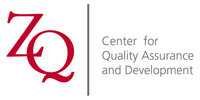A modified peer review procedure is adopted at Johannes Gutenberg University; it includes the following three stages:
- internal evaluation
- external evaluation and
- target agreement.
The latter is concluded between the evaluated faculty and the university administration board on the basis of the evaluation results.
Procedure
The decision-making process for evaluating a faculty requires agreement about the basic aims and premises of the intended evaluation. Experience gathered from previous evaluations has shown that it is worthwhile to have an intra-organizational exchange, as well as a formal resolution of the department council or the equivalent body within a faculty.
The task of the internal evaluation is to present the strengths and weaknesses of the subject area in the form of an internal evaluation report. Alongside the consideration of quantitative data and the presentation of the subject area's structure, the basis for this internal evaluation report is the qualitative analysis of cumulative discussions held with the individual status groups or department units. These discussions are moderated and documented by the ZQ.
It is the responsibility of the subject area to produce the report with the agreement and cooperation of the ZQ. The external evaluation includes appraisals by external peers from other higher education institutes or non-university institutions. Alongside the internal evaluation report, the basis for this expert opinion is an on-site assessment where the experiences of different status groups in an evaluated faculty are shared in the form of discussion groups and individual discussions.
Based upon the external expert opinion and the internal evaluation report, representatives of the faculty and the university administration board conduct performance appraisals in which measures and the intended time periods for their completion are fixed.
Premises of the Mainz model
The orientation of the evaluation procedure in Mainz differs somewhat from the procedures at other higher education institutes.
The central aspects of evaluation at Mainz University are questions about the research, teaching and study organization, and the profiling and structural development planning of a domain.
The Mainz model for evaluation is aimed at more than simply generating data. It focuses upon the context-dependent interpretation of the situation in degree courses, subject areas or departments and is activity-oriented. We consider evaluation to be a support mechanism for restructuring the facilities. A key aspect of this understanding is that the evaluated units cooperate and accept the procedures.
